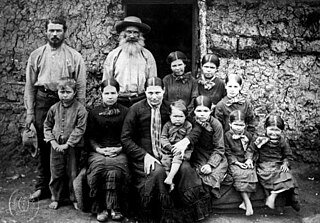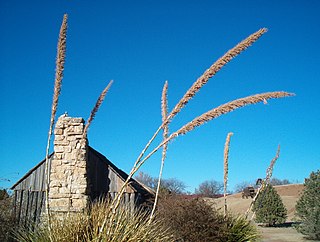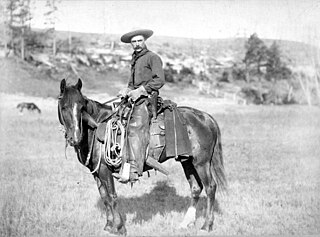Frontier War(s) or frontier war(s) may refer to:

Boers are the descendants of the proto Afrikaans-speaking Free Burghers of the eastern Cape frontier in Southern Africa during the 17th, 18th, and 19th centuries. From 1652 to 1795, the Dutch East India Company controlled Dutch Cape Colony, but the United Kingdom incorporated it into the British Empire in 1806. The name of the group is derived from Trekboer then later "boer", which means "farmer" in Dutch and Afrikaans.

The Second Great Awakening was a Protestant religious revival during the early 19th century in the United States. The Second Great Awakening, which spread religion through revivals and emotional preaching, sparked a number of reform movements. Revivals were a key part of the movement and attracted hundreds of converts to new Protestant denominations. The Methodist Church used circuit riders to reach people in frontier locations.

A frontier is the political and geographical area near or beyond a boundary. A frontier can also be referred to as a "front". The term came from French in the 15th century, with the meaning "borderland"—the region of a country that fronts on another country. Unlike a border—a rigid and clear-cut form of state boundary—in the most general sense a frontier can be fuzzy or diffuse. For example, the frontier between the Eastern United States and the Old West in the 1800s was an area where European American settlements gradually thinned out and gave way to Native American settlements or uninhabited land. The frontier was not always a single continuous area, as California and various large cities were populated before the land that connected those to the East.

A Regional Bell Operating Company (RBOC) was a corporate entity created as result of the antitrust lawsuit by the U.S. Department of Justice against the American Telephone and Telegraph Company (AT&T) in 1974 and settled in the Modification of Final Judgment on January 8, 1982.

The American frontier, also known as the Old West, popularly known as the Wild West, encompasses the geography, history, folklore, and culture associated with the forward wave of American expansion in mainland North America that began with European colonial settlements in the early 17th century and ended with the admission of the last few contiguous western territories as states in 1912. This era of massive migration and settlement was particularly encouraged by President Thomas Jefferson following the Louisiana Purchase, giving rise to the expansionist attitude known as "manifest destiny" and historians' "frontier thesis". The legends, historical events and folklore of the American frontier have embedded themselves into United States culture so much so that the Old West, and the Western genre of media specifically, has become one of the defining periods of American national identity.

American exceptionalism is the belief that the United States is either distinctive, unique, or exemplary compared to other nations. Proponents argue that the values, political system, and historical development of the U.S. are unique in human history, often with the implication that it is both destined and entitled to play a distinct and positive role on the world stage.

The Military Frontier was a borderland of the Habsburg monarchy and later the Austrian and Austro-Hungarian Empire. It acted as the cordon sanitaire against incursions from the Ottoman Empire.

The Colt Single Action Army is a single-action revolver handgun. It was designed for the U.S. government service revolver trials of 1872 by Colt's Patent Firearms Manufacturing Company and was adopted as the standard-issued pistol of the U.S. Army from 1873 until 1892.

Lord Dunmore's War, also known as Dunmore's War, was a brief conflict in fall 1774 between the British Colony of Virginia and the Shawnee and Mingo in the trans-Appalachian region of the colony south of the Ohio River. Broadly, the war included events between May and October 1774. The governor of Virginia during the conflict was John Murray, 4th Earl of Dunmore, who in May 1774, asked the House of Burgesses to declare a state of war with the Indians and call out the Virginia militia.

The camp meeting is a form of Protestant Christian religious service originating in England and Scotland as an evangelical event in association with the communion season. It was held for worship, preaching and communion on the American frontier during the Second Great Awakening of the early 19th century. Revivals and camp meetings continued to be held by various denominations, and in some areas of the mid-Atlantic, led to the development of seasonal cottages for meetings.

Marriner Stoddard Eccles was an American economist and banker who served as the 7th chairman of the Federal Reserve from 1934 to 1948. After his term as chairman, Eccles continued to serve as a member of the Federal Reserve Board of Governors until 1951.
Western Front or West Front may refer to:
Fort Cumberland may refer to:
Fort George may refer to:

The Prohibitory Act was British legislation in late 1775 that cut off all trade between the Thirteen Colonies and England and removed the colonies from the King's protection. In essence, it was a declaration of economic warfare by Britain as punishment to the American colonies for the rebellion against the King and British rule that became known as the American Revolutionary War.
The Limes Arabicus was a desert frontier of the Roman Empire, running north from its start in the province of Arabia Petraea. It ran northeast from the Gulf of Aqaba for about 1,500 kilometers (930 mi) at its greatest extent, reaching northern Syria and forming part of the wider Roman limes system. It had several forts and watchtowers.

Frontier Communications Parent, Inc. is an American telecommunications company. Known as Citizens Utilities Company until 2000, Citizens Communications Company until 2008, and Frontier Communications Corporation until 2020, as a communications provider with a fiber-optic network and cloud-based services, Frontier offers broadband internet, digital television, and computer technical support to residential and business customers in 25 states. In some areas it also offers home phone services.

The Niagara Frontier refers to the stretch of land in the United States that is south of Lake Ontario and north of Lake Erie, and extends westward to Cleveland, Ohio. The term dates to the War of 1812, when the northern border was in contention between the United States and British forces in Canada. It refers only to the land east of the Niagara River and north of Lake Erie within the United States. The western side of the Niagara River, on the Canada/Ontario side, is the Niagara Peninsula; it is considered part of the Golden Horseshoe.

A ribāṭ is an Arabic term, initially designating a small fortification built along a frontier during the first years of the Muslim conquest of the Maghreb to house military volunteers, called murabitun, and shortly after they also appeared along the Byzantine frontier, where they attracted converts from Greater Khorasan, an area that would become known as al-ʻAwāṣim in the ninth century CE.

There is evidence of prehistoric human habitation in the region known today as the U.S. state of Wyoming stretching back roughly 13,000 years. Stone projectile points associated with the Clovis, Folsom and Plano cultures have been discovered throughout Wyoming. Evidence from what is now Yellowstone National Park indicates the presence of vast continental trading networks since around 1,000 years ago.